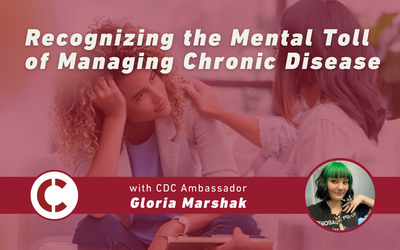
By CDC Ambassador Gloria Marshak
Living with a chronic disease is challenging, and during election seasons, the stress and worry can make it feel even harder to manage. With so much news and differing opinions, it’s common for people with chronic conditions to feel anxious and overwhelmed.
Recent CDC data reveals 60% of people with chronic conditions feel stressed by managing their health, and 50% say it affects their mental well-being. Many patients feel isolated, which can make managing one’s conditions even more difficult.
Almost 1 in 4 adults in the U.S. has experienced mental health challenges in the past year, and living with a chronic disease increases the chance of also struggling with issues like depression or anxiety. Unfortunately, mental health problems can also make chronic disease symptoms worse, creating an even bigger burden.
CDC Ambassador Gloria Marshak from Virginia understands this firsthand. She was diagnosed with mental health disorders, anxiety and depression, before anyone attempted to look into her physical struggles.
“Everything always seemed to come down to my mental health rather than my physical experience” she points out. “I never have been ashamed of having mental health disorders, but I wanted someone to see that my symptoms expanded beyond that. Things just felt like they didn’t add up.”
Gloria’s experience is common among people with chronic illness—many feel ignored or not taken seriously by doctors.
"Understanding how to best navigate the current U.S. healthcare system as a person with a chronic illness was difficult, especially when I didn’t have much support from my initial medical providers" she says. Learning to advocate for herself was a big part of her journey. And she’s not alone—40% of our survey participants said they feel isolated because of their condition, and nearly 1 in 5 said they’ve been told by doctors that their illness was “all in their head.”
For Gloria, finding a community has made a great positive impact in her life.
"Connecting with peers with the same or similar diagnoses has been life-changing," she says. "It’s helped me feel less alone and more in control of my health. It’s one thing for a doctor to give you textbook information about a disorder, but it is a completely different experience to have peers share their very own experiences, struggles, and successes with one another in a safe space."
Why We Need Change
The mental toll of chronic illness is real, and it affects millions of Americans every day. We need to change the way healthcare works so that people with chronic illnesses get the support they need.
Gloria believes that sharing her story and using her voice is one of the best ways she can help. As someone who is dual diagnosed with both mental health and chronic physical conditions, she believes sharing her story is a powerful tool for herself and the community.
“Connecting with others, whether they have chronic illness or not, by using my voice is one of the most powerful tools I have.”
At the Chronic Disease Coalition, we’re committed to making these changes happen. We believe no one should have to face their condition alone. If you want to get involved, check out the resources below and take the first step today.
- Apply to be an ambassador
- Send a letter
- Have a meeting
- Watch a chronic university
- Sign up for newsletters
- Follow us on X
- Follow us on Instagram
- Follow us on Facebook
- Follow us on LinkedIn